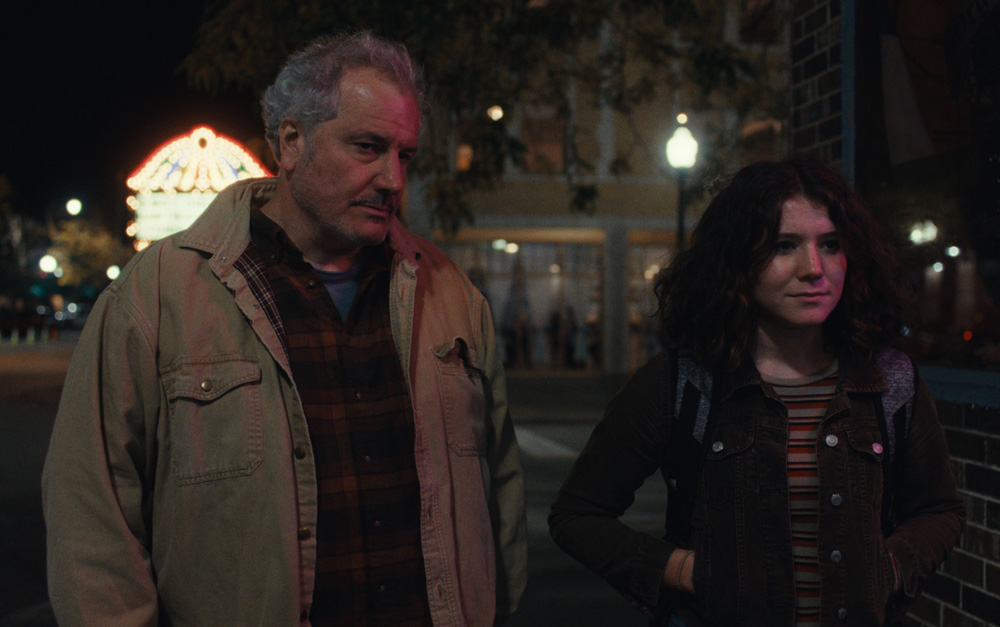As she had so many times before over a career in the theater, Kelly O’Sullivan found refuge in a production that the National Theatre had made available to stream of “Romeo and Juliet” during the darkest moments of the pandemic where she suddenly she had Jessie Buckley and Josh O’Connor to keep her company and while there was comfort in the familiarity of a classic story, new ideas from the 400-year-old play were revealing themselves. O’Sullivan and her partner Alex Thompson had been stuck in other ways beyond quarantine when their follow-up to “Saint Frances” required a larger budget to match their ambition, and once it would be safe to work again, O’Sullivan saw what would become “Ghostlight” as an opportunity to bring people together again, writing a juicy lead role for her former co-star in a production of “The Humans,” Keith Kupferer, and eventually inviting his daughter Katherine Mallen Kupferer and wife Tara Mallen, accomplished actors in their own right, to occupy roles in the film that they held in real life, playing a family grieving the loss of their son.
Like “Romeo and Juliet,” there is a tragic dimension to O’Sullivan and Thompson’s second film, but it will surely be remembered more as a romance as Kupferer’s construction worker Dan falls in love with the theater, unexpectedly joining a company of local community players as they put on Shakespeare’s most famous work, led by the indefatigable Rita (Dolly De Leon), that would seem to offer a more hospitable place to process any feelings about his son than the therapy sessions that others have been urging. When his teen daughter Daisy (Mallen Kupferer) has been acting out, it seems like her energy might be better put to use on stage as well where they are eventually joined by Sharon (Mallen), who has to wonder why there’s all the sudden interest after years of putting on the class play at school.
However, the appeal isn’t lost on those watching “Ghostlight,” which may be smaller in scale than what O’Sullivan and Thompson had been planning for their follow-up to one of the great first features of this century, but it is no less formidable as an emotional powerhouse, having the organic frisson of a real-life family at its core showing each other the kind of tough love you’d expect only to see behind closed doors, but moves gracefully between harsh reality they occupy when amidst their grief they have to endure a court case and the land of enchantment they can duck inside of a cozy community theater where there’s no judgment. Like “Saint Frances,” O’Sullivan crafts a script that is both witty and wise and just as the invitation into a sacred space led her to write “Ghostlight,” she has extended that to so many others with the tender dramedy. After the film made a miraculous debut at Sundance a mere three months after it completed principal photography, “Ghostlight” is now beginning its theatrical run and O’Sullivan and Thompson spoke about how they turned around such a delicate story so quickly, building off the natural charms of the family of actors at its center, and summoning the magic of the theater.
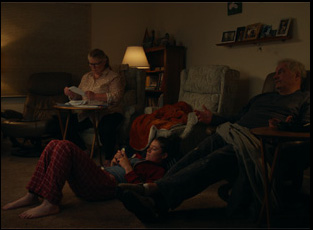
Alex Thompson: You picked the right verb there. This is so ridiculous now, but “Mouse,” this film that Kelly wrote that we’re going make next, was going to be [the film for Kelly to] find your legs and learn and then “Mouse” got bumped. So “Ghostlight,” which I had been envious of for a long time, became the next step, and I think in the meantime, Kelly was feeling a lot more confident and I basically had to make a case for myself as a co-director.
Kelly O’Sullivan: And there was a period of time where I was like, “Let me just think about it and I’ll let you know.”
Alex Thompson: You did. And I think I was pretty hands off, but…
Kelly O’Sullivan: Very persuasive. I’m really glad it worked out this way. I know it’s a better film because we co-directed it.
It couldn’t have come out any better and it’s enchanting from the very first frame when you see that curtain pull back. How did you land on something so mundane and theatrical all at once to start this?
Kelly O’Sullivan: Well, the idea for the curtain, that was [Alex].
Alex Thompson: I didn’t know if you were going to say it.
Kelly O’Sullivan: Yeah, that was [Alex]. Because in the original script, there was always the sound of the orchestra tuning up and the audience quieting down and then when the lights come up, it’s, “Oh, what a beautiful morning” [from “Oklahoma”] on top of this circle of dead grass in the backyard. But [Alex] took it a step further, which I think is a really smart idea of the curtain opening. Originally, we had it where fan hands open the curtain, but we ended up not using that.
Alex Thompson: It looked like garbage. But we loved the idea of this is going to be a theatrical movie. Why not literally open a curtain on it?
Kelly O’Sullivan: Yeah, and those curtains are actually the same curtains that begin the performance [at the end of the film] when Daisy steps out to get the prologue.
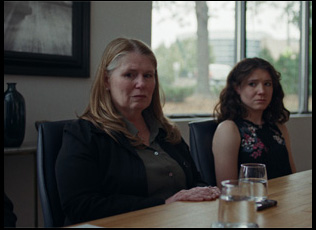
Alex Thompson: It was in some ways like an evolution where because the story has more catharsis, and swings even harder in certain moments, it felt like it gave us more agency to use just a wider breadth of film language, so we could make stronger statements with the way that we cut it and the way that we shot it. But we tried to use very similar lensing as “Saint Frances.” Luke Dyra, who shot it, was the gaffer on my last film, “Rounding,” and he’s worked for a decade with Nate Hurtsellers, and Nate was going to shoot this, so Luke was just hyper aware of wanting to honor that palette and that world that we had built over the years, and it felt like a very organic development.
Kelly O’Sullivan: And we took inspiration from a lot of theater movies that we’ve seen. We looked at the way they shot some of their proscenium moments in “Waiting for Guffman,” and we referenced “Theater Camp,” which Nate Hurtsellers shot.
Alex Thompson: And “Moonstruck” was a big one for me because there’s so much in that film that contains the tragedy and the comedy in the same frame. Finding those touchstones was really easy once the actors came to set because they ended up showing us what felt right. Katherine’s face demanded a certain lens, and then that became her lens.
Something I realized that was crazy to me is that the way the characters in the film are introduced to the theater are apparently how the family came onboard to the film…
Kelly O’Sullivan: That is so funny. That is exactly the way it happened. Yeah, that it was Keith and then Katherine and then Tara.
What it was like to incorporate them into the film you’re making? Because having that real family dynamic must’ve changed things at least a little.
Alex Thompson: Things got way easier as soon as we cast all of them. As soon as they all showed up on set and we first got them on camera together, we were like, “Oh my gosh, it’s going to be so easy,” at least the scenes with them because they had so much chemistry and their built-in dynamic was such a joy to capture on camera, and as we were casting them one by one, there was this idea, “Oh, that’d be cool. We have a chance to have all three of them?” And then it all culminated in just their incredible chemistry.
Is it true you could parlay some of their energy between scenes or takes into the scenes themselves?
Alex Thompson: Yeah, I remember the dinner table scene was the first thing we shot with all three of them and Tara was literally like telling Kat, “Quit it, stop it.”
Kelly O’Sullivan: Same in the principal scene.
Alex Thompson: And we were like, “Actually, why don’t we start the scene with that exact energy of those little ad libs?” And I think they started to really get into it. We got spoiled because they were so good at, as you said, parlaying that energy into what they were doing, that then when we started to bring other actors in and we moved in further into the schedule, we had to be like, “Okay, actually, let’s go back to the script.” But yeah, the [line Katherine says] ‘Leonardo DiCaprio does not look like that anymore…’”
Kelly O’Sullivan: Keith gave Katherine that line. And then in the batting cages before the dialogue starts, when Katherine’s like, “Oh, word, that’s a homer” — that’s them just being themselves.
Alex Thompson: We shot that scene in six minutes. They’re just that good.
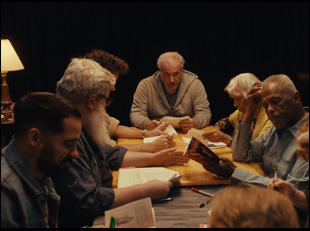
Kelly O’Sullivan: I think it really helped because there was no dilly-dallying. “Saint Frances” was shot in a very similar way in that as soon as we got the green light, we were just like, “Okay, let’s go,” and it does make you act on instinct. There was a lot of intention and a lot of thought behind everything, but once you’re on set, you’re responding to things in the moment in a super-instinctual way.
Alex Thompson: Yeah, it felt like every day there were opportunities to just bring stuff in where we’re like, “All right, we’re on a moving train, pulling ideas aboard as you pass them.” And then at the end of the day, you’re like, “Okay, what did we get?” It felt like we were the ensemble [in the film], pulling it together.
From what I remember, you actually show the family scenes before getting to the theater stuff…
Alex Thompson: That scared me, to be honest.
Kelly O’Sullivan: Yeah, it scared us because shooting all the family stuff was the most dramatic and most emotionally heavy, so I remember that first week when we were done, we were like, “Oh gosh, is this [movie] going be like too punishing, too sad?”
Alex Thompson: Scowls and dark glances.
Kelly O’Sullivan: And repression. And then we began shooting the theater stuff and it was exactly what it is for [Keith Kupferer’s character] Dan, which is it was this incredible breath of fresh air where you were like, “Oh God, we get to breathe. We get to play and we get to dance,” and we [realized], “Okay, this is going to be a fun, funny movie too.”
Alex Thompson: Wasn’t the [scene in the] lawyer’s office with the fart the first thing we did after the house?
Kelly O’Sullivan: The deposition, yeah.
Alex Thompson: So Brad Smith, who was in the opening scene of “Saint Frances” [and plays the family’s lawyer in “Ghostlight”] has this very arch comic energy, and I remember him sitting across from the family who we’d been photographing for five days being so sad and he’s like, “Okie dokie,” kind of like this Looney Tune. And that same day we did the [joke with the] fart in the bathroom and I was like, “I don’t know if this is going to work, but it works on the page and everybody’s being honest, so we’ve just got to trust the process.”
Kelly O’Sullivan: And because our editor was editing as we were filming, he said that once he started getting the theater stuff, he was like, “Oh, okay, phew, here’s our movie.”
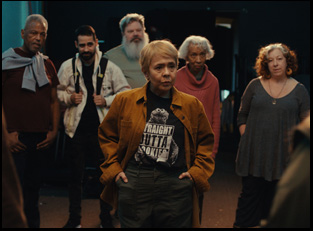
Alex Thompson: It was hard. It was deciding like, “Okay, who’s going to be in the house? Who’s going to be seated? We wanted to make the space feel like you could work as an actor in any corner of that room and because we did all that stuff back-to-back-to-back, every new scene, we’d shift the furniture or we’d decide that people were sitting in different places and that lent itself to new dynamics. It was fun because our M.O. was just to keep it interesting and keep it dynamic.
Kelly O’Sullivan: And I loved anything in that rehearsal space because it really did feel like the rehearsal spaces I’ve been in at a million different times and points in my career, so it felt very organic to place people and be like, “Okay, and then you would stand over here.” It felt really fun.
Alex Thompson: There’s a scene of when Dan gets chosen to be Romeo, and he’s surprised by it and we put Lenora and Rita in the vom [the area between the seats of the theater and the exits], and then Alma is coming back from the bathroom, so we created this story that she overhears it on the way and we follow her through [the passage] and we see her a little excited before [she tells Dan] “Congratulations.” All those little dynamics you get to see in one shot and it was actually pretty exciting. There were definitely days when it felt like, “Okay, we’re here again doing Shakespeare,” but for the most part, it was just fun and every one of those scenes has a dark side to the coin. Dan is in play, and then suddenly he’s made painfully aware of where he’s come from, almost in every one of those.
That energy just radiates off the screen. What’s it been like to connect with audiences now?
Kelly O’Sullivan: A total joy. You just never know how something’s going to be received, and after “Saint Frances,” I was especially like, “Oh no, what if we disappoint people now? Or what if nobody cares? Because it’s not about [something like] abortion or menstruation, what if [they think] it’s boring?” And what’s been really, really nice is that it feels like it’s been welcomed with open arms and that people identify with it. I’m especially thrilled anytime non-theater nerds are like, “Oh my gosh, yeah, I loved it,” and we’ve had so many people say, “I was in high school theater and this makes me miss it. Or Dan reminds me of my dad.” When people identify with it in really specific ways, it’s incredibly moving.
Alex Thompson: And the standing ovations for Keith – I can feed off that all day. Seeing them celebrated has been the best.
“Ghostlight” opens on June 14th in New York at the IFC Center and in Los Angeles at the Landmark Sunset 5 before expanding.




